Читать книгу The Life of Samuel Johnson, LL.D. - James Boswell - Страница 176
На сайте Литреса книга снята с продажи.
APPENDIX E. JOHNSON’S ‘ENGAGING IN POLITICKS WITH H——N.
Оглавление(Page 490.)
In a little volume entitled Parliamentary Logick, by the Right Hon. W.G. Hamilton, published in 1808, twelve years after the author’s death, is included Considerations on Corn, by Dr. Johnson (Works, v. 321). It was written, says Hamilton’s editor, in November 1766. A dearth had caused riots. ‘Those who want the supports of life,’ Johnson wrote, ‘will seize them wherever they can be found.’ (Ib. p. 322.) He supported in this tract the bounty for exporting corn. If more than a year after he had engaged in politics with Mr. Hamilton nothing had been produced but this short tract, the engagement was not of much importance. But there was, I suspect, much more in it. Indeed, the editor says (Preface, p. ix.) that ‘Johnson had entered into some engagement with Mr. Hamilton, occasionally to furnish him with his sentiments on the great political topicks that should be considered in Parliament.’ Mr. Croker draws attention to a passage in Johnson’s letter to Miss Porter of Jan. 14, 1766 (Croker’s Boswell, p. 173) in which he says: ‘I cannot well come [to Lichfield] during the session of parliament.’ In the spring of this same year Burke had broken with Hamilton, in whose service he had been. ‘The occasion of our difference,’ he wrote, ‘was not any act whatsoever on my part; it was entirely upon his, by a voluntary but most insolent and intolerable demand, amounting to no less than a claim of servitude during the whole course of my life, without leaving to me at any time a power either of getting forward with honour, or of retiring with tranquillity’ (Burke’s Corres. i. 77). It seems to me highly probable that Hamilton, in consequence of his having just lost, as I have shewn, Burke’s services, sought Johnson’s aid. He had taken Burke ‘as a companion in his studies.’ (Ib. p. 48.) ‘Six of the best years of my life,’ wrote Burke, ‘he took me from every pursuit of literary reputation or of improvement of my fortune. In that time he made his own fortune (a very great one).’ (Ib. p. 67.) Burke had been recommended to Hamilton by Dr. Warton. On losing him Hamilton, on Feb. 12, 1765, wrote to Warton, giving a false account of his separation with Burke, and asking him to recommend some one to fill his place—some one ‘who, in addition to a taste and an understanding of ancient authors, and what generally passes under the name of scholarship, has likewise a share of modern knowledge, and has applied himself in some degree to the study of the law.’ By way of payment he offers at once ‘an income, which would neither be insufficient for him as a man of letters, or disreputable to him as a gentleman,’ and hereafter ‘a situation’—a post, that is to say, under government. (Wooll’s Warton, i. 299.) Warton recommended Chambers. Chambers does not seem to have accepted the post, for we find him staying on at Oxford (post, ii. 25, 46). Johnson had all the knowledge that Hamilton required, except that of law. It is this very study that we find him at this very time entering upon. All this shows that for some time and to some extent an engagement was formed between him and Hamilton. Boswell, writing to Malone on Feb. 25, 1791, while The Life of Johnson was going through the press, says:—
‘I shall have more cancels. That nervous mortal W. G. H. is not satisfied with my report of some particulars which I wrote down from his own mouth, and is so much agitated that Courtenay has persuaded me to allow a new edition of them by H. himself to be made at H.‘s expense.’
(Croker’s Boswell, p. 829). This would seem to show that there was something that Hamilton wished to conceal. Horace Walpole (Memoirs of the Reign of George III, iii. 402) does not give him a character for truthfulness. He writes on one occasion:—‘Hamilton denied it, but his truth was not renowned.’ Miss Burney, who met Hamilton fourteen years after this, thus describes him:—‘This Mr. Hamilton is extremely tall and handsome; has an air of haughty and fashionable superiority; is intelligent, dry, sarcastic, and clever. I should have received much pleasure from his conversational powers, had I not previously been prejudiced against him, by hearing that he is infinitely artful, double, and crafty.’ (Mme. D’Arblay’s Diary, i. 293).
*
